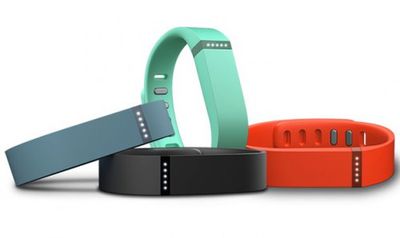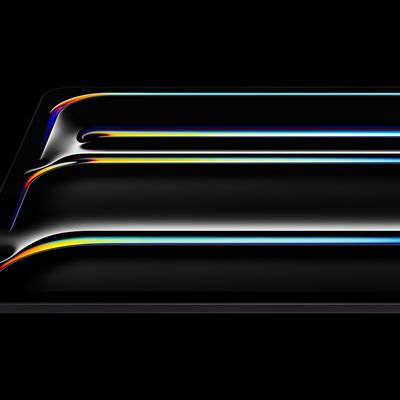Apple Follows Through With Plans to Stop Selling Fitbit Devices
Last month, news surfaced of Apple's plans to cease selling Fitbit's line of activity tracking devices in its stores, and as of today, it appears the company has followed through with that decision. All Fitbit products have now been removed from the online Apple Store and Apple has begun removing the devices from its retail stores as well.
Apple previously sold both the Fitbit Flex, Fitbit's activity tracking band, and the Fitbit One, a standalone tracker that could be clipped to clothing, for $99.95. It is not known why Apple opted to remove Fitbit's products from its online stores, but the decision follows Fitbit's announcement that it had no plans to integrate with Apple HealthKit, as it is "working on other exciting projects" for Fitbit users.

Fitbit's activity trackers are similar in function to Apple's upcoming Apple Watch, offering users the ability to track steps taken, distance traveled, calories burned, stairs climbed, and more. Last week, Fitbit announced a new Surge "Fitness Super Watch" that also includes GPS functionality and a heart rate monitor, bringing its tracking capabilities even more in line with the Apple Watch.
Though Fitbit devices have been removed from Apple Stores, Apple is continuing to sell other fitness tracking products, including the UP from Jawbone and the Nike Fuelband. Jawbone recently introduced the UP3, its most recent fitness tracking device that includes skin and ambient temperature sensors along with a heart rate monitor. It is unclear whether Apple will continue to sell these devices as the launch of the Apple Watch approaches or if the ban is limited to Fitbit.
Fitbit's activity trackers are not the first products that Apple has removed from its stores in recent weeks. Earlier in October, Apple removed Bose audio products from its stores, no longer offering the headphones online or in retail locations.
Popular Stories
While the iPhone 17 Pro and iPhone 17 Pro Max are not expected to launch until September, there are already plenty of rumors about the devices.
Below, we recap key changes rumored for the iPhone 17 Pro models as of March 2025:
Aluminum frame: iPhone 17 Pro models are rumored to have an aluminum frame, whereas the iPhone 15 Pro and iPhone 16 Pro models have a titanium frame, and the iPhone ...
With the second release candidate of iOS 18.4 that Apple seeded out today, the company finally provided us with release notes that give a full rundown on what to expect.
There's an Apple Vision Pro app, new Apple Intelligence features for notifications and additional language support, plus an Apple News Food feature for Apple News+ subscribers, and several updates that should improve the...
Apple is reportedly working on a new Magic Mouse. Below, we recap what to expect.
The two key rumors for the Magic Mouse 3 so far include a relocated charging port, along with a more ergonomic design.
It was briefly rumored that the Magic Mouse 3 would also feature voice control, but that was misinterpreted information.
Relocated Charging Port
While the Magic Mouse switched from...
Apple's big developer event is a little over two months away, and rumors about what we can expect to see in Apple's next major operating system updates are becoming increasingly frequent.
A public release of iOS 18.4 is also imminent with a number of updates and improvements, although we won't be getting the major Apple Intelligence Siri upgrades that had reportedly been planned for this...
We've been hearing rumors about a foldable iPhone for almost a decade now, but it looks like we might finally see the device come to fruition in 2026. We're going to be waiting many more months for the foldable iPhone, but so far we're hearing good things.
Apple wants to make it creaseless. It's taken Apple multiple years to design a foldable iPhone that it's satisfied with because Apple ...
Apple today released iOS 18.4 and iPadOS 18.4, the fourth major updates to the iOS 18 and iPadOS 18 operating system updates that came out last year. iOS 18.4 and iPadOS 18.4 come two months after Apple released iOS 18.3 and iPadOS 18.3.
Subscribe to the MacRumors YouTube channel for more videos.
The new software can be downloaded on eligible iPhones and iPads over-the-air by going to...
Multiple sources have claimed that iOS 19 will introduce a new design with more translucent buttons, menus, notification banners, and more, and there is now another clue that points towards this glass-like appearance.
Bloomberg's Mark Gurman today said the new design project is codenamed "Solarium" internally. A solarium is a room with glass walls that allow in plenty of sunlight, so this...
Apple's next-generation iPad Pro models with the M5 chip will "launch this year," according to Bloomberg's Mark Gurman.
In his Power On newsletter today, Gurman said the new iPad Pro models have progressed to an "advanced testing" stage, and he expects mass production of the devices to begin in the second half of this year. If that timeframe is met, the new iPad Pro models could launch...























